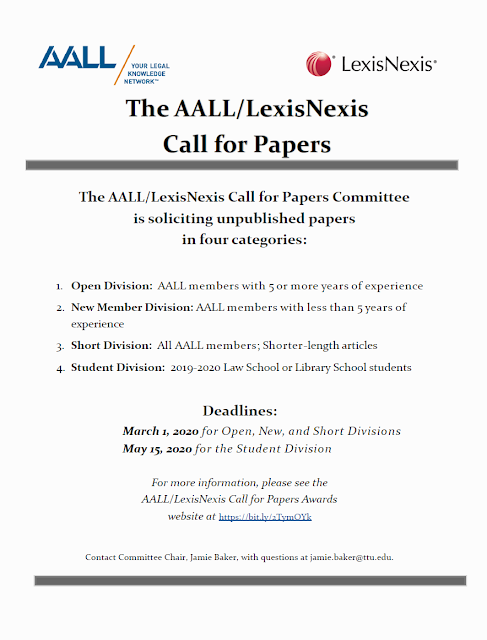Librarians Need To Bridge The "Knowledge In Action" Gap
The Chronicle of Higher Education reported on a study for Project Information Literacy - a national study about how today’s college students find and use information.
From the study, "[n]early all of the employers said they expected candidates, whatever their field, to be able to search online, a given for a generation born into the Internet world. But they also expected job candidates to be patient and persistent researchers and to be able to retrieve information in a variety of formats, identify patterns within an array of sources, and dive deeply into source material. Most important, though, employers said they need workers who can collaborate with colleagues to solve problems and who can engage in thoughtful analysis and integrate contextual organizational details rarely found online."
While these are important skills, "[m]any employers said their fresh-from-college hires frequently lack deeper and more traditional skills in research and analysis. Instead, the new workers default to quick answers plucked from the Internet. That method might be fine for looking up a definition or updating a fact, but for many tasks, it proved superficial and incomplete."
The study found "that students are poorly trained in college to effectively navigate the Internet’s indiscriminate glut of information."
"Another Project Information Literacy study, involving more than 8,300 undergraduates at 25 American colleges, found that most [students] make do with a very small compass. They rely on tried and true resources such as course readings, library databases, Google, and Wikipedia. Only 20 percent of the students said they ever sought help from librarians, the mavens of searching and finding in the digital age, especially when it comes to learning how to 'ping pong' effectively and strategically among offline sources, experts, and online information, blending the full range of knowledge sources in all their forms."
The main takeaway is that students need to know how to search and contextualize the information by exhibiting knowledge in action. "Knowledge in action means being able to sort through that growing thicket of information. This is a lifelong learning skill, crucial to health, wealth, social equality, and well-being."
"Further, because our web experience will increasingly be personalized through algorithms that key off of everything from geolocation to our prior digital traces, students must learn to recognize the limits of their online environment [remember net neutrality] and to seek information creatively outside of channels that serve up results skewed by Internet companies and other paternalistic, biased, or profit-driven gatekeepers."
The problem is trying to bridge the gap. Many students are too concerned with the final grade than the process. "Librarians, trained in both digital and print research techniques, are in the best position to step into the breach. But that will require more support for library services at a time when budgets are under siege. And it will take an administrative commitment to ensure that training is incorporated comprehensively throughout the curricula."
From the study, "[n]early all of the employers said they expected candidates, whatever their field, to be able to search online, a given for a generation born into the Internet world. But they also expected job candidates to be patient and persistent researchers and to be able to retrieve information in a variety of formats, identify patterns within an array of sources, and dive deeply into source material. Most important, though, employers said they need workers who can collaborate with colleagues to solve problems and who can engage in thoughtful analysis and integrate contextual organizational details rarely found online."
While these are important skills, "[m]any employers said their fresh-from-college hires frequently lack deeper and more traditional skills in research and analysis. Instead, the new workers default to quick answers plucked from the Internet. That method might be fine for looking up a definition or updating a fact, but for many tasks, it proved superficial and incomplete."
The study found "that students are poorly trained in college to effectively navigate the Internet’s indiscriminate glut of information."
"Another Project Information Literacy study, involving more than 8,300 undergraduates at 25 American colleges, found that most [students] make do with a very small compass. They rely on tried and true resources such as course readings, library databases, Google, and Wikipedia. Only 20 percent of the students said they ever sought help from librarians, the mavens of searching and finding in the digital age, especially when it comes to learning how to 'ping pong' effectively and strategically among offline sources, experts, and online information, blending the full range of knowledge sources in all their forms."
The main takeaway is that students need to know how to search and contextualize the information by exhibiting knowledge in action. "Knowledge in action means being able to sort through that growing thicket of information. This is a lifelong learning skill, crucial to health, wealth, social equality, and well-being."
"Further, because our web experience will increasingly be personalized through algorithms that key off of everything from geolocation to our prior digital traces, students must learn to recognize the limits of their online environment [remember net neutrality] and to seek information creatively outside of channels that serve up results skewed by Internet companies and other paternalistic, biased, or profit-driven gatekeepers."
The problem is trying to bridge the gap. Many students are too concerned with the final grade than the process. "Librarians, trained in both digital and print research techniques, are in the best position to step into the breach. But that will require more support for library services at a time when budgets are under siege. And it will take an administrative commitment to ensure that training is incorporated comprehensively throughout the curricula."


Comments
Post a Comment